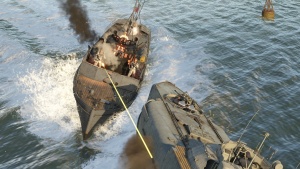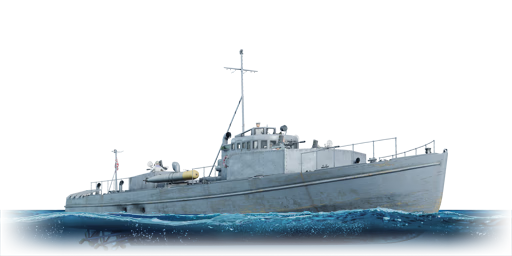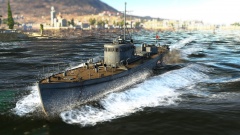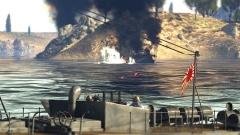Type T-51b
| This page is about the Japanese motor torpedo boat Type T-51b. For the premium version, see Type T-51a. |
Contents
Description
The Type T-51b (No.11) was a remodelling effort aimed at meeting the weight expectations of its predecessor, the Type T-51a (No.10), which failed to meet its targets. Efforts were made to reduce weight and simplify construction by eliminating the fluid coupling and employing a four-shaft propulsion system. The number of torpedoes was reduced to two, while the 25 mm guns were increased to three. Despite these measures, the weight was only reduced to 75 tons which together with slow production was on path to fail like the previous T-51a. Harassment of shipping lanes by US patrol boats prompted the emergency development of the next Type B (Otsu/乙) small patrol boat (Type T-38) with higher production output. Consequently, further orders for the Type T-51 were cancelled, with only 7 completed (No.11-17), 3 scrapped (No.18-20), and an additional 20 planned (No.21-41) also cancelled.
It was originally introduced as the Type T-51 in Update 1.89 "Imperial Navy", modeled as a T-51a with a triple mount 25 mm in the rear, but was remodeled in Update "Drone Age". Compared to the Type T-51a, the T-51b has more conventional gun placement and angles, and it offers only 2 torpedoes. The T-51b can be played aggressively due to well-positioned autocannons, decent survivability, and small hitboxes for guns and gunners. It easily out-damages most boats at its BR and lower. However, it struggles against high-caliber, armor-piercing shells and has poor anti-air capabilities, requiring smart positioning to avoid dive-bombers. Its good manoeuvrability helps in dodging torpedoes.
General info
Survivability and armour
Despite of lack of armor, a widely distributed crew of 18 makes this boat surprisingly survivable. Size-wise it's just large enough to distribute damage without having any obvious weak-spot. Additionally engines are well-protected by the fuel tanks (both: in front of, and behind the four engines), making it unlikely to ever lose all the power, though fires will be a real issue, making Fire Protection System arguably the most-wanted modification for the boat right after unlocking it.
One most interesting aspect of the boat (and a distinguishing factor from the Type T-51a) is the shield in front of the bridge and two gunners. While it does not show as the armor protection, it essentially works like one. Even 40mm HEF shells hitting the shield will not do any permanent damage to any of the components of the ship - instead, the round will be stopped in place, exploding in vain. All of the high explosive rounds (e.g. HEI, HEF, IAI, FI-T) will suffer the same fate. It works even for rockets or a large-caliber shells, as long as they hit far-enough from the main hull to avoid overpressure damaging it.
Survivability of the boat can be increased even further, by always facing the enemy head-on, letting the bow soak up as much damage as possible without significantly affecting the crew. What should be avoided is sitting with exposed sides to the enemy, as it allows them to quickly run the crew down by spreading gunfire on the entire length of the ship.
Mobility
The T-51b isn't a hugely fast vessels by MTB standards, reaching a max of 52 km/h in RB, and 73 km/h in AB. It's also a fairly long boat, so it has a fairly wide turning circle, and takes some time to adjust direction. Its acceleration and speed in reverse also isn't too impressive. Overall, it's fast enough to cruise around the map and reach the spots it needs to, but it does lack the overall mobility to get out of trouble when avoiding bombs or trying to escape from a disadvantageous position.
| Mobility Characteristics | |||
|---|---|---|---|
| Game Mode | Upgrade Status | Maximum Speed (km/h) | |
| Forward | Reverse | ||
| AB | |||
| Upgraded | |||
| RB/SB | |||
| Upgraded | |||
Modifications and economy
Armament
Primary armament
The T-51b is equipped with three 25 mm cannons, two at the front and one at the rear. The presence of three cannons can lead for a very high damage output, though it can only bring two to bear on a target at once. The 25 mm cannons come with three belts:
- Universal - Predominantly HE rounds with an AP round, good for combating all types of vessels but not the most powerful.
- API - Predominantly AP rounds with one HE round, good for combating armoured vessels.
- HEIT - Full HE belt with few tracers, the highest damage potential against light craft, but little viability against armoured targets.
Overall, taking a mix of API and HEIT belts to switch between will let you cause maximum potential damage to all kinds of boats. The HEIT belt will cause impressive damage to lightly armoured boats- although they are slightly harder to aim as there are few tracers, and the API rounds will shred through the various armoured vessels and support craft you'll meet.
| Penetration statistics | |||||||
|---|---|---|---|---|---|---|---|
| Ammunition | Penetration @ 0° Angle of Attack (mm) | ||||||
| 10 m | 100 m | 500 m | 1,000 m | 1,500 m | 2,000 m | ||
| HEF-T* | 2 | 2 | 2 | 2 | 2 | 2 | |
| HEI | 2 | 2 | 2 | 2 | 2 | 2 | |
| HEF | 2 | 2 | 2 | 2 | 2 | 2 | |
| AP-T | 55 | 53 | 43 | 33 | 25 | 19 | |
| Shell details | ||||||||||||
|---|---|---|---|---|---|---|---|---|---|---|---|---|
| Ammunition | Velocity (m/s) |
Projectile mass (kg) |
Fuse delay (m) |
Fuse sensitivity (mm) |
Explosive mass (TNT equivalent) (g) |
Ricochet | ||||||
| 0% | 50% | 100% | ||||||||||
| HEF-T* | 900 | 0.24 | 0 | 0.1 | 8.5 | 79° | 80° | 81° | ||||
| HEI | 900 | 0.26 | 0 | 0.1 | 5.52 | 79° | 80° | 81° | ||||
| HEF | 900 | 0.25 | 0 | 0.1 | 23.93 | 79° | 80° | 81° | ||||
| AP-T | 900 | 0.28 | - | - | - | 47° | 60° | 65° | ||||
Additional armament
The T-51b is armed with two Type 2 torpedoes, they will easily destroy any MTB or large support craft, but as the maximum range is only 3 km you'll need to get a bit closer to the target or choke point than you would with other torpedoes, there's also no 'Torpedo mode' modification to allow for more travel distance, so there's no way to increase the range, this makes engaging Destroyers on the open sea quite tricky, as you'll need to make yourself vulnerable to be able to reach the torpedoes effective range.
This boat can carry twelve Type 95 depth charges, which can be dropped to maim other naval targets, they have rather limited viability though as most MTBs will be able to outrun the explosion, however they are useful for sneaking up on the larger ships, as if you can reach them unnoticed one or two of these depth charges will sink the vessel, although overall they have quite limited viability in battle currently.
Usage in battles
A good positioning of the autocannons combined with a decent survivability and a small hitboxes of the guns and gunners behind the shields makes it possible to play T-51b in a very aggressive fashion, being able to easily out-damage most of the boats on its and lower BRs. Where the boat struggles is against a high-caliber shells, especially armor-piercing that will penetrate everything, head-to-tail. A good manoeuvrability makes it easy to avoid enemy torpedoes, but a relatively large size combined with a pitiful anti-air capability means that the enemy dive-bombers have to be avoided by a smart positioning rather than the raw firepower or dodging the bombs.
T-51b benefits the most from mobility upgrades. Default shells are perfectly usable, while the targetting speed is great regardless the upgrades. An interesting thing to consider would be unlocking the armor-piercing bullets - these allow a relatively quick and easy disposal of the S-38, S-100, LS 3 or G-5, a boats where damaging multiple components through the ships really counts, making T-51b nearly a hard-counter to them, especially if they try a direct, frontal attack. On the other hand, the Dark-class with its high-caliber, quick-firing autocannon is a deadly enemy for the T-51b, and should be avoided whenever possible.
Pros and cons

Pros:
- Great damage potential from the 25 mm cannons
- 360° gun cover with at least two guns being able to shoot at any given target
- Crew spread all around the boat makes it tricky to sink, even if none of them are behind the armor
- Forward gun shield stops High Explosive bullets (e.g. HEI, HEF, IAI, FI-T) or even rockets (like from BM-14-17) without suffering structural damage to the ship, though a higher caliber shells are very likely to damage the frontal section of the hull by the overpressure.
Cons:
- Extremely narrow angles where all 3 guns can be used at the same time.
- Two forward guns have just ±10° where both can be used (even though visually there's no obstruction for a far greater horizontal guidance)
- Limited number of guns in a varied positions and with an unintuitive firing angles, making it difficult to snipe enemy dive-bombers from a safe distance
- A relatively large boat with a sub-pair maximum speed and an unimpressive manoeuvrability makes for an easier target
- Torpedoes have a limited usability due to having just 3 km range at 72 km/h
History
The Type Ko MTB (甲型魚雷艇, T-51) is a Japanese large MTB inspired by the German S-boots. This boat is separated into two group: No.10 class MTB (T-51a) and No.11 class MTB (T-51b).
After the completion of the No.1 class MTB (T-1), news about activity of the German Schnellboot (S-boot) from Europe reached the Imperial Japanese Navy (IJN). They started to copy the S-boot design, but they had only a simple sketch and one civilian motor boat owned by the Mitsui family built by Lürssen (a builder of S-boot). In that time, the Japanese did not have the experience to produce a wood-and-iron mixed large boat, so at first they built one prototype. ("Vessel No.600", later No.10 MTB)
The No.600 prototype was laid down in July 1942 by Yokohama Yacht Tsurumi factory and completed in November 1943. But because of the worsening of the war situation, they started mass-production the ship design before testing the prototype. Just afterwards, the Japanese receive official detailed drawings of 95-ft type S-boot. Basically, design of future T-51 and S-boat was similar, but there was much for the Japanese to learn.
In the designing of No.600, the Japanese simplified lots of part and material. Due to how well-crafted the S-boot design was, the simplification caused several problems. Though measures were taken to mitigate the problems, the vessel stability was not enough and so there were difficulties putting the ship into practical use.
No.600 was equipped with four Mark 71 Model 6 engines (water-cooled, 920 HP), which were a copy of the Italian MAS-451 MTB engines. There were two shafts, with two engines connected to one shaft by Vulkan coupling. However, this configuration caused an increase of weight and so the prototype exceeded the planned displacement of 84.2 tons, and instead reached 89.6 tons and so the maximum speed decreased. Because of this, the boat was redesigned into the No.11 class MTB, which eliminated the coupling and so each engine had their own shaft. With this, the single No.10 class design (No.600 prototype) was named the T-51a, with the redesigned No.11 class as the T-51b that would be the model for subsequent boat numbers.
Armaments was also redesigned between the two class. The T-51a had one 25 mm twin machine gun and four 45 cm torpedoes, while the T-51b had three 25 mm single machine guns and two torpedoes.
No.10 (T-51a), No.13 and No.16 were built at Yokohama Yacht Tsurumi factory, while the other boats were built by a new shipyard, Yokohama Yacht Choshi factory. A total of ten Type Ko MTBs were laid down, but only 8 boats were completed (No.10 - No.17). Construction of Type Ko was cancelled in August 1944. No.18 was planned to equip a small diesel engine, but it was not completed. The construction of Type Ko MTBs was delayed because the No.11 class MTBs need to resolve problem discovered during the testing of No.10 class MTB. Also the Mk.71 Mod.6 engines required advanced manufacturing technology and so production of engine was also delayed.
No.10 MTB was dispatched to Truk island just after completion, but a fire broke out and sank due to air raid. No.12 MTB was brought out from Choshi to Yokosuka to equip weapons, but just after that was completed, she sunk due to an electric motor spark that ignited the gasoline and subsequently exploded.
Other vessels was deployed to the Special Attack corps, but most of them did not experience the actual battle. Only one boat deployed at Habu port of Izu Oshima attacked an enemy submarine.
Also, No.16 MTB equip only two engine. She used space of other engines for hold and used for tender boat of other small MTBs and midget submarines at Kawadana Assault Corps.[1][2]
Media
Pre-Update "Drone Age" T-51b model
Pre-Update "Drone Age" T-51b engaging an American sub-chaser
- Skins
See also
Links to articles on the War Thunder Wiki that you think will be useful for the reader, for example:
- reference to the series of the ship;
- links to approximate analogues of other nations and research trees.
External links
Paste links to sources and external resources, such as:
- topic on the official game forum;
- other literature.
References
- ↑ Imamura Yoshinobu [今村好信], (2011) Story of Japanese Torpedo Boats [日本魚雷艇物語] (Kojin-sha, 2011) pp.55-60.
| Japan boats | |
|---|---|
| Motor torpedo boats | Type T-1 · Type T-14 · Type T-14 (mod. 1) · Type T-38 · Type T-51a · Type T-51b |
| PT-802 · PT-808 · PT-15 | |
| Motor gun boats | Ha-Go (mod. 1) · Type 4 (mod. 2) · Type 4 (Mod 4) |
| Asagao (YTE-01) · PG 02 | |
| Armoured gun boats | Soukou-Tei · Soukou-Tei No.4 |
| Gunboats | Chidori |







